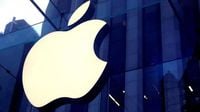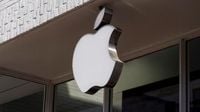Apple was hit with a hefty €150 million ($162 million) fine by French regulators on March 31, 2025, over its controversial App Tracking Transparency (ATT) feature. This ruling, issued by France's Competition Authority, marks the first antitrust penalty globally that directly targets the ATT, which Apple has marketed as a robust privacy safeguard for users.
The crux of the issue lies in the accusation of "abuse of market power" by Apple. While the tech giant promotes ATT as a means of enhancing user privacy, French authorities argue that it effectively stifles competition in the digital advertising landscape, particularly impacting smaller publishers and app developers.
Introduced in 2021, the ATT requires apps to obtain user consent via a pop-up window before they can track user activity across other applications and websites. If users decline, the app loses access to crucial data for targeted advertising. Critics, however, contend that this system primarily benefits Apple by complicating the ad tracking process for competitors.
According to the French Competition Authority, the implementation of ATT is "neither necessary nor proportionate" to its stated goal of protecting user data. They highlighted that the feature leads to an excessive number of consent requests for third-party apps on iPhones and iPads, making the user experience cumbersome. Additionally, users must opt out of ad tracking twice, which undermines the neutrality of the feature and disproportionately affects smaller publishers who rely heavily on data collection for revenue.
In a statement following the fine, Apple expressed disappointment but maintained that the French Competition Authority had not mandated any specific changes to ATT. The company asserted that the feature provides users with more control over their privacy through a clear and consistent prompt regarding tracking.
"While we are disappointed with today's decision, the French Competition Authority has not required any specific changes to ATT," Apple stated. The company emphasized that it has received strong support for ATT from consumers and privacy advocates worldwide.
Despite the fine, Apple is not required to alter its ATT implementation immediately. Instead, the responsibility to ensure compliance rests with the tech giant, which has raised concerns among industry stakeholders. The complaint that triggered this investigation was filed by digital advertising and media groups, who argued that Apple's policy created an uneven playing field, pushing out competitors and harming innovation in the advertising sector.
This ruling is particularly significant given that it comes just a year after Apple faced a staggering €1.8 billion fine from the European Union for its handling of music streaming competitors in the App Store. The growing scrutiny of Apple's practices is indicative of a broader regulatory backlash against major tech companies in Europe.
Moreover, the fine is not an isolated incident. Regulators in Germany, Italy, Poland, and Romania are also investigating Apple's ATT, suggesting that this may be the beginning of a more extensive regulatory challenge for the tech titan.
Industry stakeholders have hailed the French Competition Authority's decision as a critical victory for the approximately 9,000 companies involved in the online media and advertising ecosystem. A joint statement from various industry groups, including Alliance Digitale and the Internet Advertising Syndicate, expressed satisfaction with the ruling and its implications for competition.
"This decision marks an important victory for the 9,000 companies in the online media and advertising ecosystem," the stakeholders said. They believe that the ruling will help restore a more equitable playing field for all players in the digital advertising market.
Benoit Coeure, the head of France's Competition Authority, described the €150 million fine as "reasonable" and "appropriate" given Apple's substantial revenue, which approached $400 billion last year. He noted that the amount is relatively modest when considering the scale of Apple's operations.
As the regulatory landscape continues to evolve, the implications of this ruling extend beyond just Apple. With the European Union tightening its grip on tech giants, other companies should be prepared for increased scrutiny regarding their business practices and the impact on competition.
The battle over digital advertising and user privacy is far from over. As regulators around Europe keep a watchful eye on Apple and its ATT feature, the tech giant may find itself facing a wave of challenges that could reshape its approach to privacy and competition.
In conclusion, the €150 million fine handed to Apple serves as a stark reminder that even the biggest players in the tech industry are not above the law. As regulators push for fairness in the digital marketplace, the outcome of this ongoing saga will have lasting effects on how companies navigate the complex intersection of privacy, competition, and innovation.





